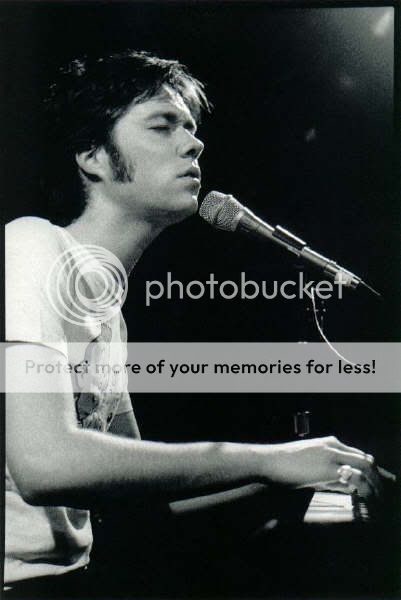 The Wiltern Theater sits at the intersection of Western Avenue and Wilshire Boulevard in Los Angeles. Built in 1931, The Warner Brothers Western Theater was originally a movie house but through renovations done in the mid 1980s, the theater now functions as a performing arts center hosting live music and other acts. The renovations have remained true to the building’s original art deco design; it was declared a historical landmark in 1979. The Wiltern Theater, considered one of the larger venues in Los Angeles, was sold out for Rufus Wainwright’s L.A. tour stop in support of his album Release the Stars.
The Wiltern Theater sits at the intersection of Western Avenue and Wilshire Boulevard in Los Angeles. Built in 1931, The Warner Brothers Western Theater was originally a movie house but through renovations done in the mid 1980s, the theater now functions as a performing arts center hosting live music and other acts. The renovations have remained true to the building’s original art deco design; it was declared a historical landmark in 1979. The Wiltern Theater, considered one of the larger venues in Los Angeles, was sold out for Rufus Wainwright’s L.A. tour stop in support of his album Release the Stars. On Release the Stars, Wainwright moves further away from his singer/songwriter persona and into the territory of showman/entertainer. Those early Gap commercials from the mid 1990s, the ones where Wainwright sat at his piano against a quintessential white backdrop playing a song of our grandparents’ generation, seem half a world away.
The early appeal of Wainwright’s music as an old soul, out of time but not out of step, is gone. With Stars, much like the Want One, Want Two double punch, Wainwright’s music feels very much timely and very much relevant. “Oh What a World,” the first track on Want One, includes the line ‘Why am I always on a plane or a fast train. Oh what a world my parents gave me? Always travelin’ but not in love.’ “Going To a Town,” from his latest effort, continues this modern world commentary with a ballad of displacement and disappointment worthy of a Billy Joel comparison. But, Rufus has morphed into the ultimate Billy Joel / Elton John mash-up; inheriting Joel’s depth and masked darkness along with John’s performance and panache.
That night's show featured a majority of songs from Release the Stars. The title track started off the show like a Broadway first act. Wainwright’s 7 piece backing band was isolated in spotlights prior to his entrance stage left. As the song began a disco ball revolving light show covered the stage in tiny white twinkles, hence releasing the stars. But this being Los Angeles, the song was not about those that fill the night sky but those that fill the stage and screen, stars who no doubt were in attendance that night. As Wainwright mentioned Melrose Avenue in “Release the Stars,” many from the crowd cheered. Wainwright then proceeded to play more tracks from his recent record, including “Sanssucci,” “Tiergarten,” and “Do I Disappoint You?”
The night included a brief intermission, which meant a wardrobe change for Wainwright; from a very colorful suit both bright white and a rainbow of colors from the warmer side of the color wheel to a lederhosen clad outfit of a young German lad. This would not be the only wardrobe change of the evening. The last two songs were off Want One, the glorious “Beautiful Child” followed by “14th Street,” which ended with a long and sustaining banjo solo that played as band members left the stage.
There was a short encore involving a Judy Garland tribute. Rufus Wainwright played two songs from his Rufus does Judy at Carnegie Hall album that featured not just musical accompaniment but choreography as well. “Poses” also made an appearance, the title track of Wainwright’s 1999 album. Sounding somber and sentimental compared to his more recent material, “Poses” was still a crowd-pleaser.
As Wainwright makes clear in his song “Oh What a World,” it’s a much different world for a gay performer now. Gone are the closeted days of Liberace. With Release the Stars, Wainwright seems to be leaving behind the cult figure of songs like “One Man Guy” and “Matinee Idol.” Release the Stars celebrates America. In Greil Marcus’s most recent book: The Shape of Things to Come, he speaks of the American artist, the one voice speaking for the whole. It is in this way Wainwright speaks on Stars, not from his own unique perspective but from the space we occupy together as Americans. This is the way gay culture has always been in American culture: from Walt Whitman to Cole Porter.
When Wainwright sings in “Going to a Town,” ‘I’m going to a town that has already been burned down,’ he’s showing us our past and our future. American exceptionalism is blessing and a curse. Through the promise and prophecy of our past, we may never know humbling. It’s from such high horses that condemn homosexuality causing Wainwright to write the lines “Do you think you go to hell for having loved?”
The backdrop for the stage show of this tour is a black and white flag; black and white stripes and in black rather than a blue square at the top left corner are not stars but broaches. The black stripes Wainwright said represented all the pain and the white all the joy in our history. For the broaches, Wainwright insisted they were because he was poor and couldn’t afford stars. But perhaps broaches, the fabulous and flamboyant pendants are actually used to represent the once hidden glittery jewels of America’s closet. Release the stars indeed.




No comments:
Post a Comment